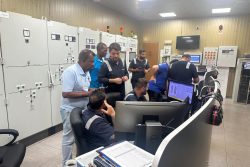The onset of the coronavirus has sent a sharp reminder to both governments and citizens in developing countries of the importance of information technology, not just as part of the broader developmental infrastructure, but as an essential tool in the execution of important responsibilities at the levels of communities and families, Chief Executive Officer (CEO) of the local technology firm, Starr Computers, has told Stabroek Business.
Speaking shortly after he had joined other past students of Charlestown Secondary School last week in making a contribution of 20 computers to his alma mater, Mohan said that while the advent of COVID-19 was “wholly undesirable and wholly unwelcome,” it had brought into sharp focus the valuable support role that information technology can play “in times of difficulty.”
Noting that this is being evidenced particularly in the field of education where the impact of the closure of schools is being minimised to varying degrees by turning to the option of online teaching/learning, Mohan said that over the period that COVID-19 had made its presence felt, “the value of computers at homes have escalated significantly across the world.”
Asserting that humans have always been accustomed to socialising and interacting with one another, the Starr Computers CEO declared that home isolation had “increased the need to communicate, socialise and satisfy economic needs in new ways,” and that computers had become “by far the most effective tool to satisfy those needs in real time. Accordingly, “the value of the computer has far exceeded its selling price.”
Mohan, whose company serves as a local distributor for various international brands, told Stabroek Business that while trading had been somewhat restricted on account of the strictures associated with social distancing, “there has been a rush by the public and private sectors worldwide to acquire computers for their employees to work from homes. In addition, developed countries such as the US have begun purchasing laptops in large quantities for home-schooling students.”
Home-schooling exercises here in Guyana have been severely restricted on account of limited internet buildout on the one hand, and limited access to computers for children who continue to be away from school on account of closures associated with social distancing measures.
And according to Mohan, increased demand precipitated by the demand arising out of the onset of COVID-19 had resulted in a sharp decline in the availability of computers. “With many computer manufacturing facilities simultaneously shutting down their production plants to protect their employees, massive PC [personal computer] shortages have occurred. Exponential demand along with shortages of internal parts have driven up the price across their various supply channels. What that has meant is that computers have become the most valuable device in the current home space.”
Mohan contends that because computers are highly interactive and frequently used, the industry requires extensive technical support for hardware, software, connectivity, virus management and other facets of repairs and maintenance, on a regular basis. “Accordingly, warranty services or service contracts are generally being encouraged for users, whether homes or businesses, based on level of usage.”
The CEO remarked that the IT industry had now become sufficiently important to Guyana for it to seek to eradicate dubious entities who “offered up to five years warranty on equipment [and] who thereafter disappeared shortly after sale.” This meant that customers were often left to suffer the consequences of bad transactions with no support whatsoever.






